[ad_1]
Moving through a room as a teenage supermodel when she first came to New York, mouths would drop, drinks would appear, eyes would spring out of sockets as if from a cartoon cat. In one chatshow appearance I watched on YouTube, from 1994, the radio personality Howard Stern spontaneously undressed in front of her. Trousers, shirt, everything.
But at 57, the experience is quite different for Paulina Porizkova. One night earlier this year, she was at a party in Manhattan. Pushing her way through the crowd, she felt out of place, and invisible, and old. Then a young woman sitting at the bar grabbed her arm. “Aren’t you…?” the woman yelled over the music. “Yes,” said Porizkova quickly.
It was not unusual for her to be recognised. She’d been famous since she was four years old, first as a political pawn, when her parents left her behind in their native Czechoslovakia to escape the Soviets, but weren’t allowed to return. They staged a hunger strike in front of the Czech embassy in Stockholm, their new home, to get her back, which was all over the news in Sweden – for five years, the Swedish press camped outside Porizkova’s grandmother’s house in Czechoslovakia, where she lived until she was nine and was finally reunited with her parents. Soon after that, at 15, she was whisked to Paris to become a supermodel. At the height of her fame she signed the highest-paid modelling contract in the world. And then at 19 she became a rock star’s wife when she met Ric Ocasek of the Cars, who was more than 20 years her senior.
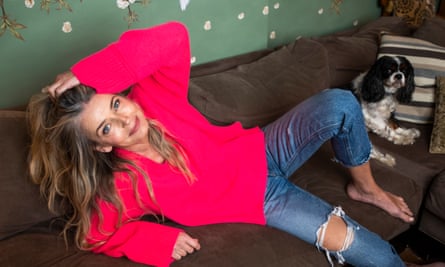
“No,” said the woman at the party. “No! You’re the lady who cries on Instagram.”
On Zoom from her rented New York apartment, Porizkova greets me in a dressing gown and wet hair, and over the course of the interview she cries three times. Delicately but in a matter-of-fact way, as if sneezing – they’re tears of grief, but also a new kind of joy. When her husband, Ocasek, died in 2019 after 30 years together, her life exploded in a series of grim fireworks. There was the shock of finding his body and having to tell their two sons, the grief at losing him, and then a final shock, which she felt as a betrayal.
Shortly before his death, when the two were amicably separating, he and his lawyers had secretly cut her out of his will, citing “abandonment”. It floored her – she believed they were still “best friends” who had gradually grown apart, but had continued living together, eating dinner together. But the will left her practically penniless – all her income (including her $6m Estée Lauder contract) had been going into the family account. When the pandemic struck, she felt suddenly very, very alone.
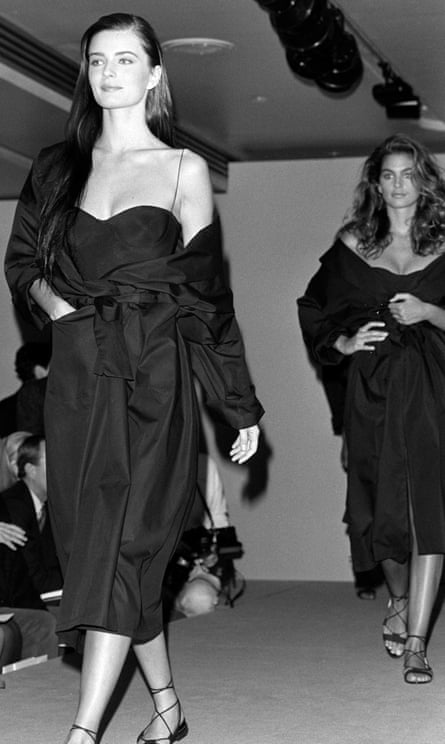
“One day when I was hideously crying, sobbing in bed, I taped it. It was performative to a certain extent, I suppose, but I’d been crying so much, it was the 100th time that week. So I wanted to see what it looked like. And then, in either a really brave or really fucking stupid move, I posted it online.” And so began her fourth fame, as an influencer of sorts, one that talks about grief, anxiety and ageing, often nude or in a bikini, and still, yes, sometimes in tears.
“It really started with the death of my husband. That’s what seemed to humanise me.” Fame, she writes in her new book, No Filter, is like a bubble – the outer surface is reflective, so when people look at you they only see themselves, and it acts as a barrier, preventing connection. Throughout her life, she says, “I have always been candid, I’ve always been unfiltered. If you ask me a question, I’m going to answer it. I’m trying to have a conversation.” The difference now that she was sobbing on Instagram was that the bubble had burst. “Now people listened. For the first time in my life I was being heard, so I could use this voice to say things, to talk about things, that were important to me, such as the invisibility of ageing, and how fucked up that is.” She smiles quietly. “Being heard is so much better than being seen. It makes you real.”
That young woman in that dark bar, she says, was giving her a huge compliment. “Until now, there’s been this diminishment of who I am as a person, because I was always just a flat image. And had she stopped there I might have taken offence, but she went on to say, ‘Thank you for being vulnerable. Because it makes me feel like I can do it, too.’” As her Instagram followers nudged towards 1m, she was invited by (former first lady of California) Maria Shriver’s publishing imprint to write a book of essays. Three months later, she emerged with her book, in which she writes about cash, love, fame and fate, as well as the sticky details of life in front of a camera.
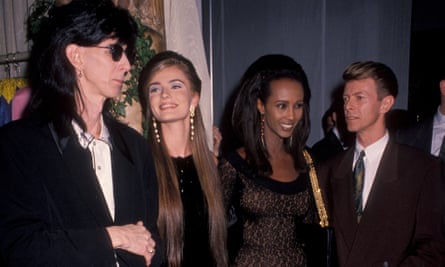
It was on her fourth booking as a model – she would have been in her mid-teens – when the photographer approached as she was having her makeup done and rested his penis on her shoulder. As the makeup artist rolled her eyes, she realised this was, “My new normal. I quickly assumed it was part of the job and I wasn’t wrong.” She wrote about the experience not because it was unusual, but because it was ordinary. “It was a freaking everyday occurrence! That was just the first time it happened. We got really good at fending off sexual harassment by making a joke of it, because you can’t insult the guy’s ego – that’s really important, he’ll never book you again. You learn all these little manipulations as a young girl.” When her peers had breakdowns and went home, she “wasn’t particularly empathic. Because I thought, ‘Well, why can’t you fend them off like I do? And why are you taking it so personally?’ But, I was a child. I was a child!”
Watching the fashion industry crack under the weight of #MeToo, at first “felt incredibly rewarding. Everybody in the business knows the same creeps, so it was kind of beautiful. A victorious moment of validation.” But: “Then some accusations came against people I liked. And that’s where things got interesting, that conflict in me. I felt like, ‘He did that to me, too, but we laughed when I told him to fuck off. So he’s not a bad guy, right?’ There was some moral wrangling I had to do.” She winces.
Though Porizkova rarely models today, on a recent shoot she was reminded how models were always called “girls”. “And modelling, I am still called a fucking girl! But I’m an old girl. That’s something we should change.” She’s not just talking about the language, she’s talking about the industry. “‘Girls’ should not be models, actually. They should be women. It’s really hard to withstand the pressures and tensions of the modelling world when you’re young, hearing all the time that you don’t measure up. Which is basically what kids are doing to each other online now, that’s what was always happening in the fashion world for models. But these kids aren’t even getting paid for it.”
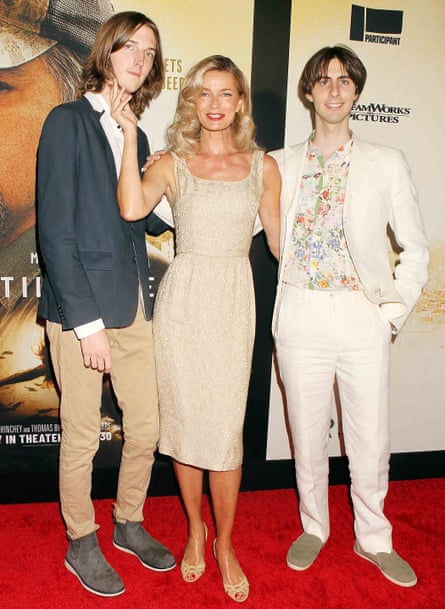
Some years ago, when Porizkova’s husband was still alive, she was at a restaurant with friends when she had a revelation. “We were all women of a certain age and a certain income bracket, very comfortable, but dissatisfied with facets of our lives,” she remembers, “and, one by one, we all admitted we were on antidepressants. We were all medicating it away.” She’d started taking SSRIs when her debilitating panic attacks had returned. She’d had them on and off throughout her life, since she was 10. It was not a happy childhood. Her father left as soon as she moved to Sweden and her mother was largely absent.
For a while it seemed as though the drugs weren’t working. Then she realised her inner world had quieted. She shrugged off arguments. Sex got worse, but life got easier. “But it turns out my creativity in a large part stems from this thing that drives me, which also produces anxiety.” Two years later she weaned herself off them. “It wasn’t until I came back to my sweaty, anxious self and decided to white-knuckle it that it dawned on me: ‘Wait, some of those things we medicate probably should be felt, so that we can learn and move on. It’s like emotional Botox. You fix one thing at the cost of another.” But, she grins, “It had been a fucking nice vacation.”
She’s dating now, or trying to, for the first time since she was 19, and it’s less fun than she imagined. It’s also making her think about real Botox, the less-emotional kind. “Dating in your 50s is a terrible place to be. So I get it, things like Botox and fillers make it a little easier to slide in, but if you have it you’re supporting the societal values that older women are not attractive. And by giving into it, we are perpetuating it. We’re agreeing that younger women are more valuable and that our age makes us ugly, that it’s a flaw, that it’s something that needs to be fixed rather than it being a natural change that is inevitable.” Most of her friends have had something done. “But I’m not going to pass judgment on others. I’d just like to maybe clean their glasses a little bit, show them the truth. Of course, then I wake up some days and go: ‘Goddammit, I need a lower facelift,’ so…” she hoots with laughter.
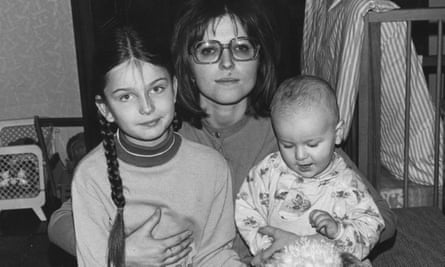
Though her posts on beauty only went viral since the pandemic, she’s been thinking about it, its responsibilities, its repercussions, for decades. “Since the age of 15, this was my whole world. I’d learned to see people in symmetry and measurements, a judgmental, crazy vision of what’s beautiful. And so then I’d try to counteract it, by thinking about whether it touched my soul.” She puts her open mindedness down to “the accidental good fortune of, at a very formative point in my life, of being called ugly.”
As the new girl at school in Sweden, she was violently bullied, her head flushed down the toilet. Then, sent to Paris on a modelling assignment, “I remember standing in front of the mirror, and going, nothing’s changed. I look exactly the same way as I did three weeks ago, but three weeks ago, I was ugly. Now I’m beautiful. It’s nothing to do with me. It’s only a change in perception. So I’ve been aware since I was a teenager that the responsibility of beauty is the beholder’s. Like, if you see a gorgeous sunset, and run towards it and fall in the ditch, it’s not the sunset’s fault.” She chuckles. “But I struggled with ‘pretty privilege’.” This is the idea that people seen as pretty, usually by European beauty standards, are given more advantages than the rest of us. “ I kept saying, ‘Yes, being thought of as beautiful is like having extra cash in your pocket that everybody can see. So you’ll get better treatment, but you’ll also get robbed.’ I don’t think I fully understood what ‘pretty’ did until I started losing it as I got older. Now I’m like, ‘Oh, I see. I’m going to get that speeding ticket now. Interesting.’” Interesting! This is how she chooses to see the world now, with its griefs and wrinkles and traumas – interesting. Curious!
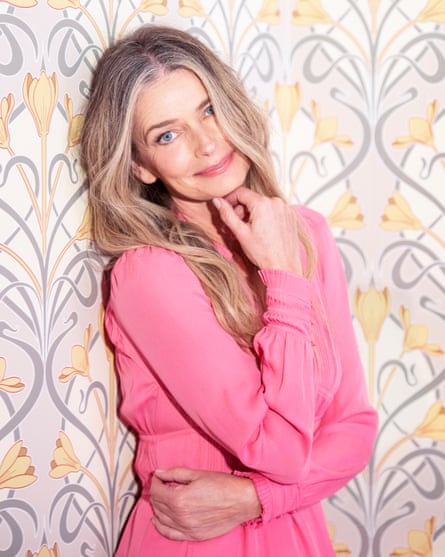
Leaning back in her chair, Porizkova shows me the temporary wallpaper she’s put up – her husband would not have approved, she notes – and the “tacky” fake fire behind her, which she loves. It’s the first time she’s lived alone and she’s slowly learning to love it. What to do next with this midlife fame? She’d like to do a reality show. “I’m not precious about my secrets. I guard other people’s, but you can have all of mine. Because secrets foster shame. And that’s one of the main things I want to exorcise out of my life. It comes back to the Botox thing, and ‘fixing’ your face. If you feel ashamed of your age, if you feel shame for not looking the way you used to, one way to fix that shame is to fix your face.” She pauses. What’s the other way? “To get rid of the shame! It’s harder. It’s harder, but I’m working on it. I feel powerful now.” She gasps. “I think this is the first time I’ve said that out loud. I feel like I am in my power. That’s pretty awesome, no?”
I spend some time, later, watching more clips of Porizkova in her youth, modelling in Paris in a number of jazzy hats, leaping through waves in a bathing suit, and I come upon another chatshow appearance – David Letterman in 1986, when she was 21. “Do you find that models are vain and shallow and superficial?” he asks her, leaning in. Yes, she replies, lightly. “But, you don’t include yourself in that category?” “I don’t see myself as a model, David,” she purrs, holding his gaze. “What do you see yourself as?” Raising an eyebrow, she says, “A human being.” And the studio audience collapses with laughter.
No Filter: The Good, the Bad, and the Beautiful by Paulina Porizkova is published by The Open Field, an imprint of Penguin Random House US, at £22.82
Hair by Jerome Cultrera at LAtelier NYC using Oribe; and makeup by Steven Canavan at LAtelier NYC using MAC
[ad_2]
Source link